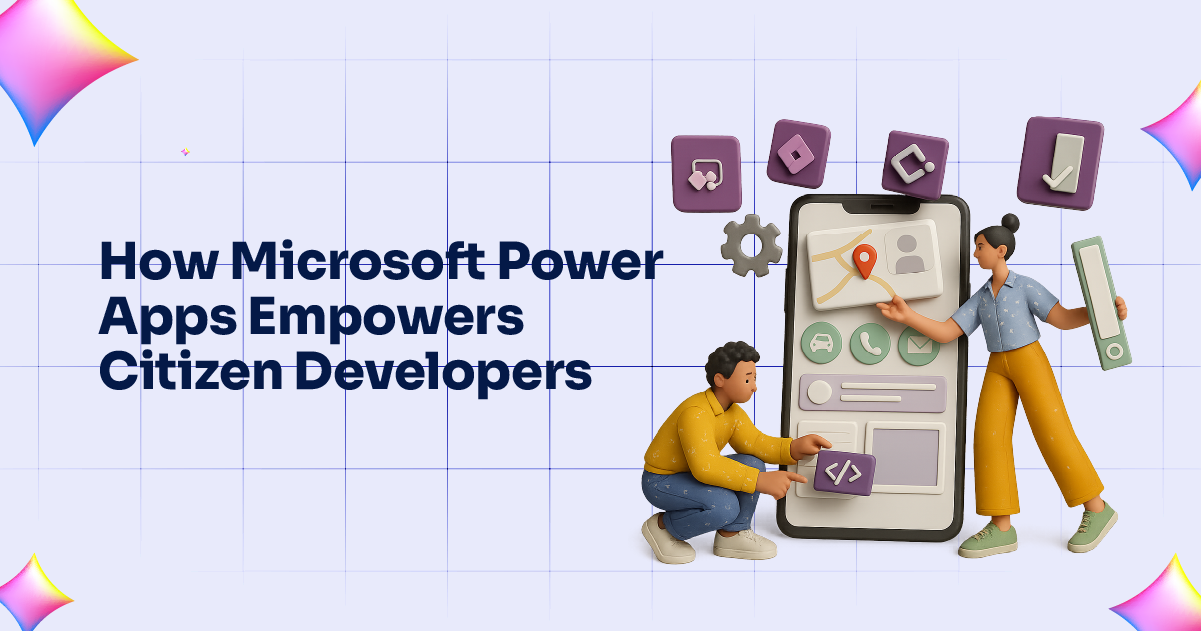
In today’s fast-paced digital landscape, organizations are constantly seeking ways to improve efficiency, automate processes, and reduce costs. While traditional software development remains crucial, the rise of citizen developers—non-technical business users who create applications using low-code/no-code platforms—has transformed how companies build and deploy business solutions.
Microsoft Power Apps is at the forefront of this movement, enabling employees without a formal coding background to create custom business apps. With its intuitive interface, powerful integration capabilities, and seamless compatibility with the Microsoft ecosystem, Power Apps is empowering citizen developers to solve problems and drive innovation from within.
What Is a Citizen Developer?
A citizen developer is typically a business user, not part of the IT department, who leverages low-code tools to create applications that improve daily workflows or solve specific challenges. These individuals understand their team’s needs better than anyone else and, with the right tools, can turn ideas into functional apps—without waiting for IT to build them.
Microsoft Power Apps bridges this gap by providing a platform that simplifies app development, allowing anyone to build mobile-friendly and responsive apps quickly.
Key Features of Microsoft Power Apps for Citizen Developers
1. Drag-and-Drop Interface
Power Apps offers a user-friendly, drag-and-drop interface that removes the complexity of traditional coding. Users can select elements such as text fields, buttons, forms, and media files, placing them on the canvas to create apps that meet their needs.
2. Integration with Microsoft 365 and Beyond
Power Apps integrates seamlessly with Microsoft 365, SharePoint, Excel, Teams, and other tools, making it easy for citizen developers to build apps that pull and push data across the ecosystem. This deep integration enables real-time collaboration and ensures the app fits naturally into the user’s workflow.
For businesses looking to further enhance their Microsoft ecosystem, Microsoft 365 Managed Services can provide expert support and optimization for all 365 applications.
3. Pre-Built Templates and Connectors
Power Apps includes numerous templates and more than 500 data connectors. Whether pulling customer data from Salesforce, integrating with Power BI for analytics, or connecting to Microsoft Dataverse, these tools give users the power to build robust, data-driven applications.
4. Security and Governance
Though designed for ease of use, Power Apps does not compromise on security. It allows organizations to maintain control over data access, user roles, and compliance through Microsoft’s security framework and Azure Active Directory. This ensures that even apps created outside of IT remain secure and compliant.
Benefits of Power Apps for Organizations
1. Faster Problem Solving
Citizen developers can build applications in days—sometimes hours—compared to traditional development cycles that take weeks or months. This agility enables teams to rapidly solve problems and respond to evolving business needs.
2. Reduced IT Backlog
With citizen developers taking on more application development responsibilities, IT departments can focus on more complex, high-value tasks. This reduces development backlogs and enhances overall productivity.
3. Cost Efficiency
Developing custom applications traditionally requires a significant investment in time, money, and developer resources. Power Apps dramatically reduces these costs by enabling business users to create apps themselves, often using existing infrastructure.
4. Empowered Workforce
Perhaps the most valuable benefit is empowerment. Power Apps puts the power of innovation directly in the hands of employees. This fosters a culture of creativity, ownership, and continuous improvement.
Real-World Use Cases of Power Apps by Citizen Developers
- HR Departments create onboarding apps to streamline the new hire experience.
- Sales Teams build mobile-friendly tools to track leads and manage client interactions in real time.
- Operations Managers design inventory tracking apps to monitor supplies and automate restocking.
- Finance Teams use Power Apps to automate approval workflows and expense tracking.
Each of these apps can be created without writing a single line of code, leveraging the business knowledge of the user to build targeted, functional solutions.
Best Practices for Empowering Citizen Developers
While Power Apps is intuitive, organizations should provide training and establish governance frameworks to ensure the success of their citizen development initiatives. Here are a few best practices:
- Offer Training and Resources: Provide workshops or online courses to help users get familiar with Power Apps and Microsoft Power Platform.
- Create a Governance Model: Define who can build apps, how data should be used, and which types of applications require IT approval.
- Encourage Collaboration with IT: While citizen developers work independently, collaboration with IT ensures security, performance, and scalability.
- Leverage Managed Services: Partnering with a Microsoft 365 Managed Services provider ensures your Power Apps environment is optimized, secure, and supported by experts.
Conclusion
Microsoft Power Apps is revolutionizing how business applications are built, enabling non-developers to become creators. By empowering citizen developers, organizations unlock new levels of agility, efficiency, and innovation. When supported by a strong governance model and expert services like Microsoft 365 Managed Services, Power Apps becomes a powerful tool that drives digital transformation from the inside out.
Whether you’re in HR, sales, operations, or finance, Power Apps gives you the tools to build the solutions you need—when you need them. It’s time to put innovation in the hands of those who understand your business best: your people.
